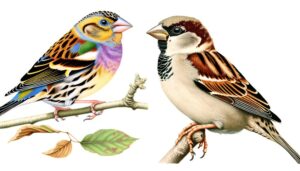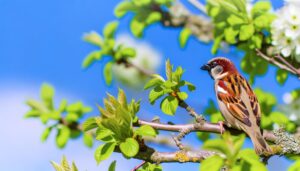Do Baby Sparrows Sleep a Lot?
Yes, baby sparrows sleep a lot. They exhibit polyphasic sleep patterns, resting in short episodes of 10 to 15 minutes throughout the day.
In total, they sleep around 12-14 hours daily. These cycles are vital for neurogenesis, tissue growth, and energy conservation.
Daytime naps are frequent and shorter, while nighttime sleep tends to be longer and more continuous. Environmental factors like temperature, light, and nutrition heavily influence their sleep quality.
Proper feeding with protein-rich insects also plays a significant role. Observing their sleep can provide insights into their health and development, leading to deeper understanding.
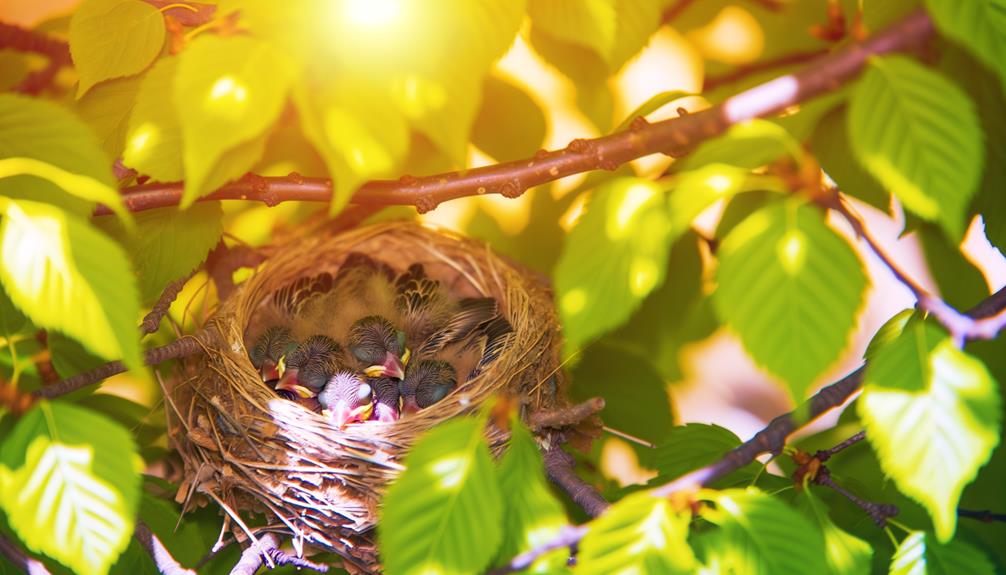
Key Takeaways
- Baby sparrows sleep for about 12-14 hours daily.
- Their sleep is polyphasic, featuring short naps of 10-15 minutes.
- Nighttime sleep is longer and more uninterrupted compared to daytime naps.
- Sleep is crucial for their neurological development and growth.
- Adequate sleep is influenced by factors such as temperature, nutrition, and light exposure.
Sleep Patterns of Baby Sparrows
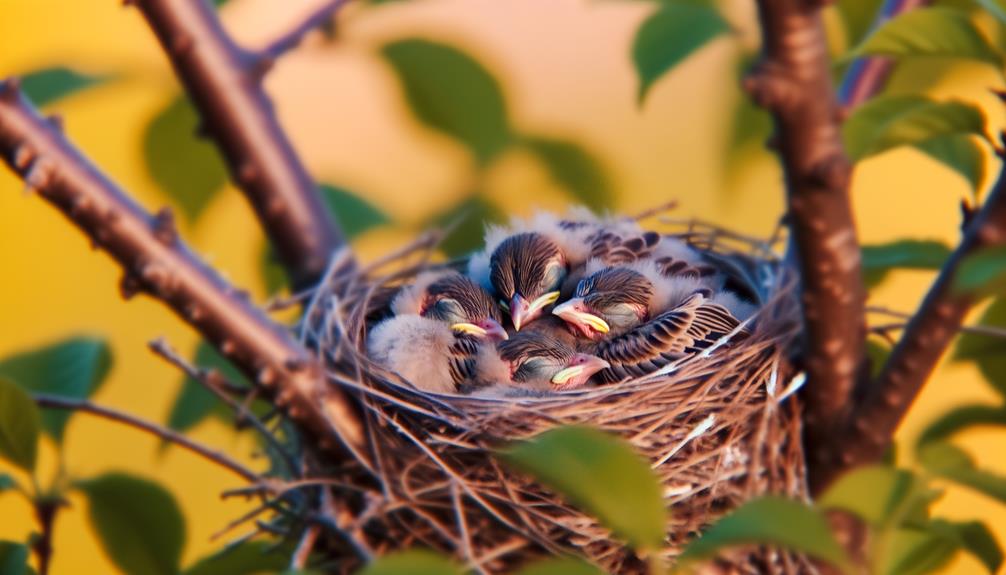
You'll notice that baby sparrows exhibit polyphasic sleep patterns, meaning they sleep multiple times throughout a 24-hour period. Observing these fledglings, you'll see their sleep-wake cycles are fragmented into short episodes. Each sleep bout typically lasts around 10 to 15 minutes.
This behavior is essential because it allows them to frequently wake for feedings and vigilant checks for predators. Scientific studies have shown that these polyphasic patterns are regulated by their circadian rhythms.
Notably, you'll find that these sleep intervals are synchronized with their diurnal activity, maximizing their growth and survival. Understanding these patterns equips you to better care for baby sparrows, ensuring they get the rest they need while staying nourished and safe.
Importance of Sleep for Fledglings
You'll notice that fledglings require significant sleep to support their rapid developmental phases, including neurogenesis and tissue growth.
Studies indicate that sleep also aids in energy conservation, which is vital for their survival and subsequent fledging activities.
Development and Growth Benefits
Adequate sleep is essential for fledgling sparrows, as it directly influences their neurological development and overall growth trajectory. When sparrows sleep, their brains undergo synaptic pruning, a process that refines neural connections, enhancing cognitive functions essential for survival.
Sleep also promotes growth hormone secretion, which is crucial for physical development, including muscle and feather formation. Studies show that sleep-deprived fledglings exhibit slower growth rates and impaired motor skills, affecting their ability to forage and evade predators.
Energy Conservation Strategies
Recognizing sleep as an important component for energy conservation, fledgling sparrows manage their energy reserves more efficiently, optimizing their chances of survival. When these young birds sleep, they reduce metabolic rates, which minimizes energy expenditure.
This conservation strategy is essential because fledglings have high energy demands for growth and development. Studies show that adequate rest supports their immune function, making them less susceptible to diseases. Additionally, sleep facilitates memory consolidation, which is crucial for learning survival skills such as foraging and predator avoidance.
Typical Sleep Duration
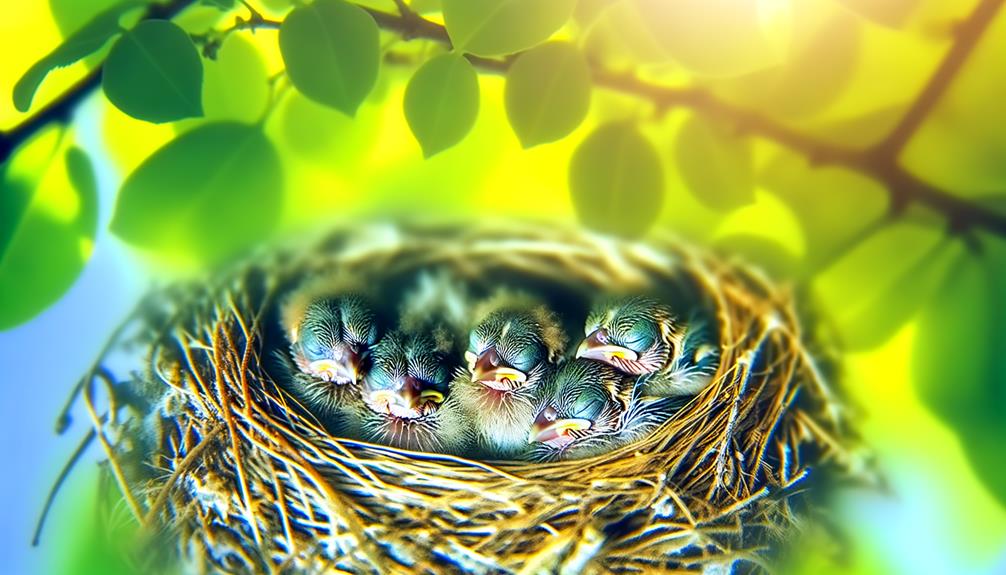
You'll notice that baby sparrows typically sleep for about 12-14 hours daily, which is vital for their growth and development.
Observations show they follow polyphasic sleep cycles, consisting of multiple short naps throughout the day and night.
Ensuring a perfect resting environment, free from disturbances, is essential to maintain their natural sleep patterns and overall well-being.
Daily Sleep Hours
On average, baby sparrows sleep approximately 12-14 hours per day, a duration crucial for their growth and development. Observing their daily sleep hours, you'll notice they enter a state of rapid eye movement (REM) sleep, important for neural maturation.
During these extended sleep periods, their bodies prioritize energy for cellular repair and growth hormone release. Research shows that adequate sleep directly correlates with their immune system's efficiency and cognitive functions.
Sleep Cycle Patterns
Baby sparrows demonstrate polyphasic sleep cycles, characterized by multiple bouts of sleep throughout a 24-hour period. You'll notice these young birds tend to sleep frequently but for shorter durations, usually ranging from 10 to 20 minutes per nap. This pattern is essential for their rapid growth and development. Observational studies have shown that these intermittent naps optimize energy conservation and enhance their survival chances.
Here's a breakdown of typical sleep duration:
| Sleep Session | Duration (minutes) |
|---|---|
| Early Morning | 10-15 |
| Late Morning | 10-20 |
| Afternoon | 15-20 |
| Early Evening | 10-15 |
| Night | 15-20 |
Understanding these patterns helps you better support baby sparrows, ensuring they get the rest they need to thrive.
Resting Environment Needs
Creating an ideal resting environment for baby sparrows involves securing a quiet, safe, and stable habitat that supports their frequent and short sleep sessions. Baby sparrows typically sleep in bursts, often lasting 20-30 minutes each.
You should provide a nesting area shielded from predators and excessive noise. Nest materials like soft grasses and feathers can mimic natural conditions, fostering a sense of security. Maintaining the temperature remains consistent, as fluctuations can disrupt their sleep.
Additionally, keeping low light levels during rest periods aligns with their natural circadian rhythms. By focusing on these specific environmental factors, you can greatly enhance their sleep quality, promoting better growth and development for these delicate avian infants.
Factors Affecting Sleep
Several environmental and physiological factors intricately influence the sleep patterns of baby sparrows, shaping their development and overall health. Temperature plays a vital role; ideal warmth encourages restful sleep, while extreme cold or heat can disrupt their sleep cycles.
Light exposure also impacts their circadian rhythms, with artificial lighting potentially disturbing natural sleep patterns. Additionally, nutrition greatly influences their sleep quality. Adequate feeding ensures they've the necessary energy reserves for uninterrupted sleep, promoting growth and immune function.
Stressors such as predator presence or loud noises can induce anxiety, resulting in fragmented sleep. By understanding these factors, you can create a supportive environment that fosters healthy sleep for baby sparrows, thereby contributing to their well-being and survival.
Daytime Vs. Nighttime Sleep
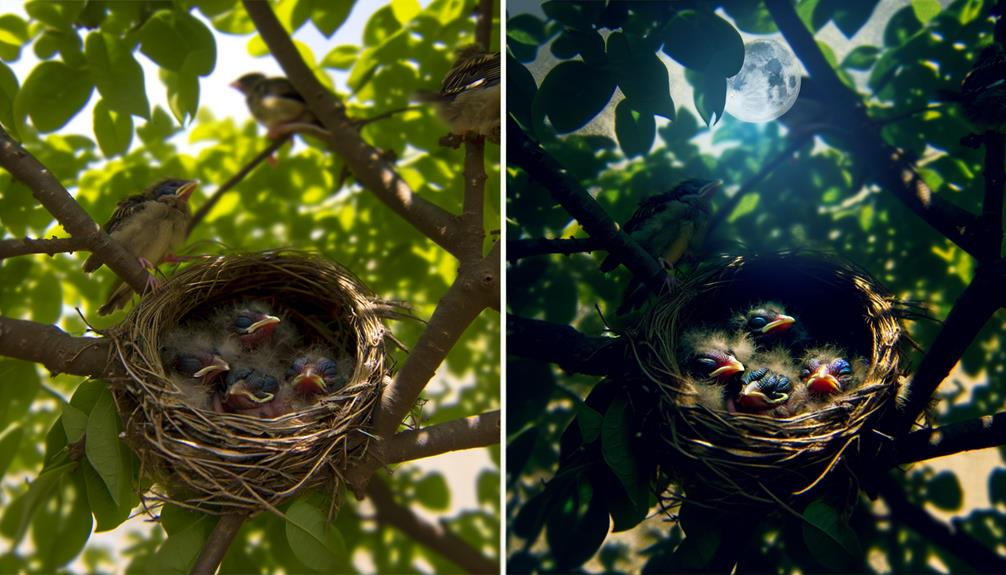
You'll observe that baby sparrows exhibit distinct daytime nap patterns characterized by shorter, more frequent bouts of sleep compared to their nighttime rest habits.
Scientific evidence suggests that the presence of light during the day influences these naps, while the absence of light at night promotes longer, uninterrupted sleep periods.
Understanding these sleep behaviors requires examining the impact of circadian rhythms and environmental light cues.
Daytime Nap Patterns
In examining the sleep behaviors of baby sparrows, it's evident that their daytime naps differ substantially from their nighttime sleep in both duration and quality. Daytime naps are shorter and more fragmented, allowing baby sparrows to remain alert to potential threats and feeding opportunities. Observations show that these naps last from several minutes to an hour, with frequent interruptions.
| Time of Day | Duration | Quality |
|---|---|---|
| Morning | 10-20 minutes | Light, fragmented |
| Midday | 15-30 minutes | Light, fragmented |
| Afternoon | 20-40 minutes | Moderate, periodic |
| Late Afternoon | 30-60 minutes | Deep, sporadic |
| Evening | 10-20 minutes | Light, fragmented |
Nighttime Rest Habits
Unlike their fragmented daytime naps, baby sparrows' nighttime sleep is characterized by longer, more consistent periods of rest, often spanning several hours uninterrupted. You'll observe that these extended sleep phases are important for their growth and development.
In nocturnal rest, baby sparrows enter deeper sleep stages, including REM (Rapid Eye Movement) sleep, which is crucial for brain maturation. Studies indicate that these prolonged sleep cycles contribute significantly to cognitive functions and physical growth in avian species.
Light and Dark Impact
Exposure to light and dark cycles profoundly influences baby sparrows' sleep patterns, dictating the quality and duration of their rest. During daylight, baby sparrows experience fragmented sleep due to increased activity and feeding schedules. In contrast, nighttime provides a continuous, undisturbed sleep environment facilitated by the absence of light, leading to deeper rest and critical growth development.
| Light Exposure | Sleep Characteristics |
|---|---|
| Daytime | Fragmented, shorter durations |
| Nighttime | Continuous, deeper sleep |
Scientific studies have shown that light exposure decreases melatonin levels in baby sparrows, impacting their circadian rhythms and sleep quality. By understanding these patterns, you can ensure optimal care for baby sparrows, fostering their development and well-being. Implementing light-dark cycles mimicking natural habitats can greatly improve their sleep health.
Nesting and Sleep Safety
Ensuring baby sparrows' nests are well-constructed and properly positioned noticeably reduces the risks associated with predation and environmental hazards, thereby promoting safer and more restful sleep patterns.
Position the nest high in dense foliage to minimize exposure to predators like cats and snakes.
Utilize natural materials, such as twigs and grass, to create a sturdy structure that can withstand inclement weather.
A well-insulated nest maintains ideal thermal regulation, essential for the developing chicks' sleep cycles.
Monitor for signs of parasites, as infestations can disrupt sleep and overall health.
Feeding and Sleep Correlation
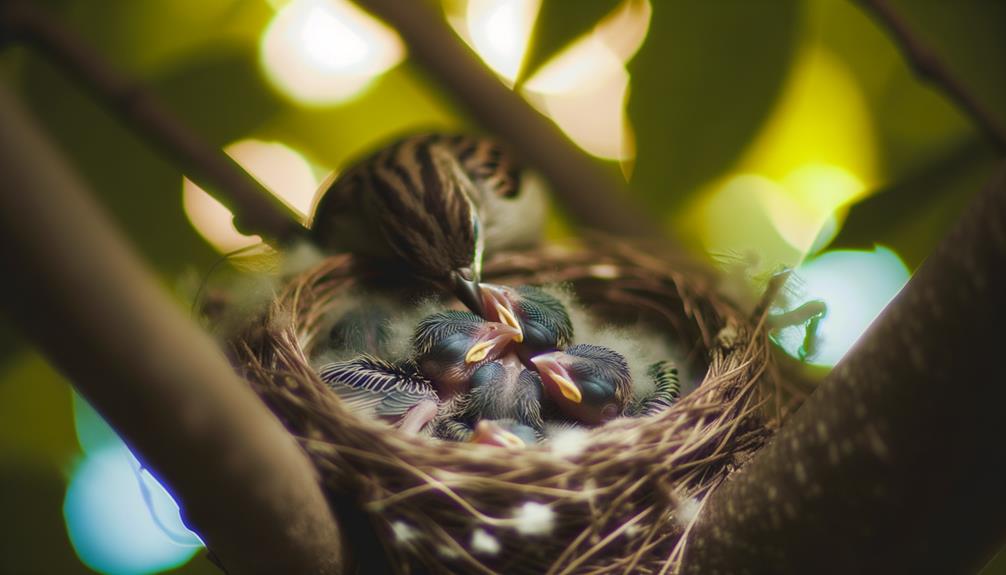
The nutritional intake of baby sparrows directly influences their sleep quality and duration. Proper feeding guarantees the energy reserves necessary for sustained rest and growth. You'll observe that well-fed chicks exhibit extended sleep periods, essential for their rapid developmental phases.
Their diet, primarily consisting of protein-rich insects, assures they have the metabolic fuel required for regenerative sleep cycles. Studies indicate that frequent, balanced meals lead to stable glucose levels, promoting uninterrupted sleep.
Conversely, undernourished sparrows often experience fragmented rest, impacting their growth rate and overall health. By ensuring these baby birds receive sufficient nourishment, you directly enhance their ability to maintain peak sleep patterns, which is essential for their survival and well-being.
Health Indicators in Sleep
Observing baby sparrows' sleep patterns provides valuable insights into their overall health, as consistent, uninterrupted sleep often indicates ideal physiological conditions and robust growth. You'll find that sleep quality can reveal much about their development. For example, frequent interruptions or irregular sleep might signal nutritional deficiencies or environmental stressors.
Here's a quick reference table for common sleep health indicators:
| Sleep Pattern | Possible Health Indicator | Recommended Action |
|---|---|---|
| Consistent, Uninterrupted | Peak Growth | Maintain current care |
| Frequent Interruptions | Nutritional Deficiencies | Review diet, supplement if needed |
| Irregular Sleep | Environmental Stressors | Improve habitat conditions |
| Excessive Sleep | Potential Illness | Consult a veterinarian |
| Reduced Sleep | Overstimulation | Minimize disturbances |
Comparisons With Adult Sparrows
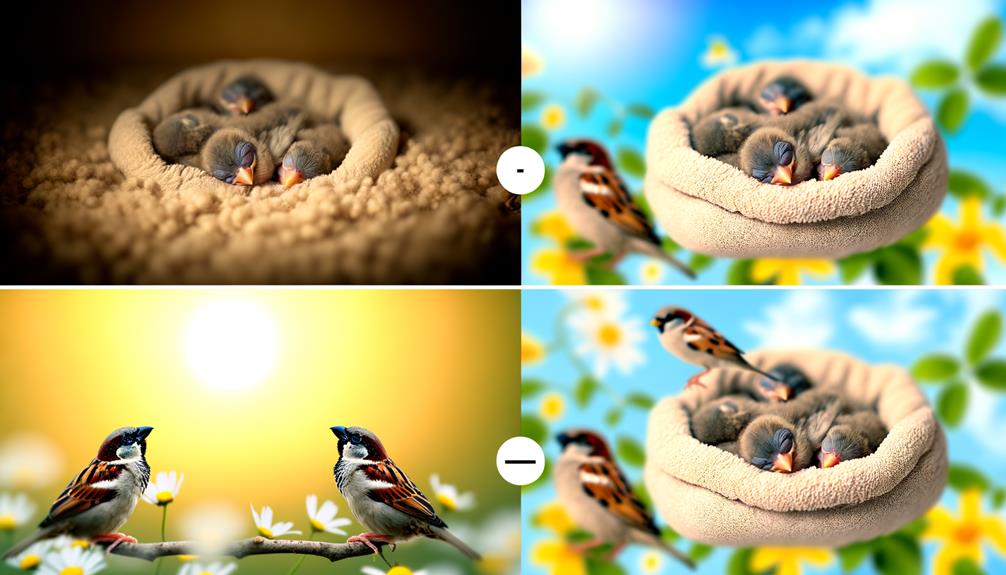
When comparing the sleep patterns of baby sparrows to adults, you'll notice that adults typically exhibit more consistent and consolidated sleep cycles, reflecting their fully developed physiological and neurological systems.
In contrast, baby sparrows experience polyphasic sleep, where multiple short naps occur throughout the day and night. This fragmented sleep pattern is essential for their rapid growth and development.
The circadian rhythms in adult sparrows are more stabilized, enabling them to adapt better to environmental cues such as light and temperature. Conversely, baby sparrows' sleep is less influenced by these external factors, focusing instead on meeting their high metabolic demands.
Understanding these differences can help you provide better care, ensuring both baby and adult sparrows thrive.
Observing Sleep in the Wild
Gaining insights into baby sparrows' sleep patterns in the wild requires keen observation of their natural habitats and daily behaviors. You'll need to monitor their nests at various times to understand their sleep cycles. Note their circadian rhythms, which often align with the sunrise and sunset.
Document how often they engage in polyphasic sleep, characterized by multiple short naps throughout the day. Pay attention to environmental factors like temperature and predators, as these can impact their rest periods. Use tools like night-vision cameras for accurate nocturnal observations.
Conclusion
In observing baby sparrows, you'll find they sleep extensively, necessary for their rapid development. Studies show fledglings sleep up to 70% of the day. Factors like food availability and predation risks influence their patterns.
Remarkably, unlike adult sparrows that follow a diurnal cycle, fledglings often take frequent naps, indicating growth spurts. By comparing these patterns with adult sparrows, you'll notice how important this sleep is for cognitive and physical health, confirming the theory that ample sleep is essential for fledgling survival.




